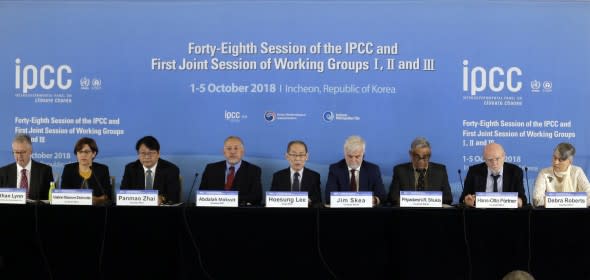UN climate change panel says 'unprecedented changes' needed to prevent rapid global warming
There are "clear benefits to people and natural ecosystems when limiting global warming to 1.5 C compared to 2 C," the Intergovernmental Panel on Climate Change (IPCC) said in a new assessment on Monday, Oct. 8.
However, limiting global warming global warming to 1.5 C would require "rapid, far-reaching and unprecedented changes in all aspects of society."
The Nobel Prize-winning IPCC is the leading world body for assessing the science related to climate change, its impacts and potential future risks, and possible response options.
The Special Report on Global Warming of 1.5 C was approved by the IPCC on Saturday in Incheon, South Korea.
It will be a key scientific input into the Katowice Climate Change Conference in Poland this December, when governments review the Paris Agreement to tackle climate change.
The Paris Agreement, adopted by nearly 200 nations in December 2015, included the aim of strengthening the global response to the threat of climate change by limiting global temperature rise no more than 2 C.

Intergovernmental Panel on Climate Change, IPCC, Chair Hoesung Lee, center, and other leaders hold a press conference in Incheon, South Korea, Monday, Oct. 8, 2018. (AP Photo/Ahn Young-joon)
Ninety-one authors and review editors from 40 countries prepared the IPCC report in response to an invitation from the United Nations Framework Convention on Climate Change (UNFCCC) when it adopted the Paris Agreement in 2015.
"One of the key messages that comes out very strongly from this report is that we are already seeing the consequences of 1 C of global warming through more extreme weather, rising sea levels and diminishing Arctic sea ice, among other changes," Panmao Zhai, Co-Chair of IPCC Working Group I, said in the statement.
In the 728-page document, the U.N. organization detailed how Earth's weather, health and ecosystems would be in better shape if the world's leaders could somehow limit future human-caused warming.
For example, by 2100, global sea level rise would be 10 centimeters lower with global warming of 1.5 C compared with 2 C.
The likelihood of an Arctic Ocean free of sea ice in summer would be once per century with global warming of 1.5 C, compared with at least once per decade with 2 C.
Coral reefs would decline by 70 to 90 percent with global warming of 1.5 C, whereas virtually all, over 99 percent, would be lost with 2 C.
"Every extra bit of warming matters, especially since warming of 1.5 C or higher increases the risk associated with long-lasting or irreversible changes, such as the loss of some ecosystems," said Hans-Otto Pörtner, Co-Chair of IPCC Working Group II.
The report also examines pathways available to limit warming to 1.5 C, what it would take to achieve them and what the consequences could be.
"The good news is that some of the kinds of actions that would be needed to limit global warming to 1.5ºC are already underway around the world, but they would need to accelerate," said Valerie Masson-Delmotte, Co-Chair of Working Group I.
Global net human-caused emissions of carbon dioxide (CO2) would need to fall by about 45 percent from 2010 levels by 2030, reaching ‘net zero' around 2050.
"Limiting warming to 1.5 C is possible within the laws of chemistry and physics but doing so would require unprecedented changes," said Jim Skea, Co-Chair of IPCC Working Group III.
If the global temperature temporarily exceeds 1.5 C, there may be a greater reliance on techniques that remove CO2 from the atmosphere to return global temperature to below 1.5 C by 2100.
However, the effectiveness of these techniques are unproven on a large scale, and some may carry significant risks for sustainable development, the report notes.
"This report gives policymakers and practitioners the information they need to make decisions that tackle climate change while considering local context and people's needs. The next few years are probably the most important in our history," she said.
